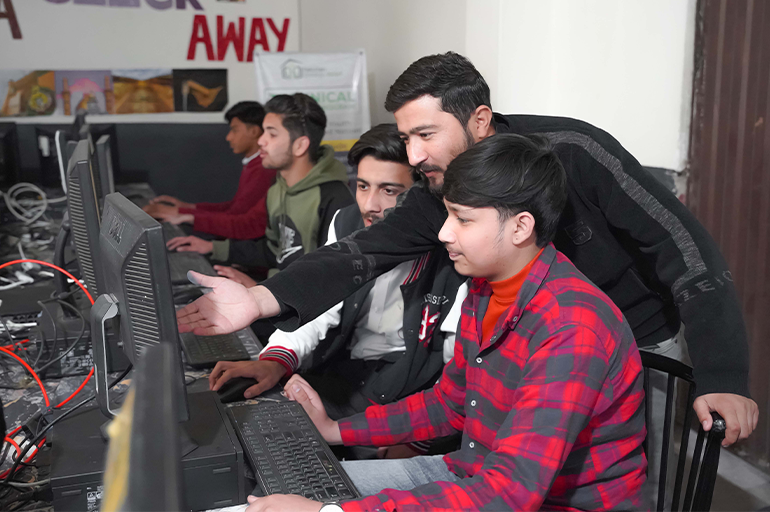Pakistan is experiencing a major shift toward digitalization, and with it comes a rising demand for skilled youth ready to participate in the modern workforce. While technology is advancing rapidly, access to quality skills training remains uneven—especially for underprivileged communities and orphaned children. This is where donors play a critical role. By contributing to technical education programs in Pakistan, investing in skill development programs, and supporting vocational training programs in Pakistan, donors help bridge the opportunity gap for thousands of young people. This article explores how donor support is empowering Pakistan’s youth, especially orphaned children, through digital skills training, educational partnerships, and long-term capacity building. Understanding Pakistan’s Digital Education Landscape Pakistan’s digital transformation is underway, yet the path is uneven. Major cities like Karachi, Lahore, and Islamabad are advancing quickly, with more youth gaining exposure to IT and e-commerce. However, rural and underserved communities still struggle with limited internet access and lack of digital infrastructure. Despite these challenges, the country is witnessing substantial efforts to enhance digital skills training for youth, bringing hope and opportunity where it’s needed most. The growing awareness of digital literacy has led to a greater emphasis on technical education for orphan children, who otherwise face limited life opportunities. Why Digital Skills Matter in Today’s Job Market Globally, employers are searching for individuals equipped with in-demand digital skills — from e-commerce and digital marketing to web development and freelancing. In Pakistan, the demand for such talent is rising due to growth in IT exports, remote work opportunities, and entrepreneurship. Youth without tech skills risk falling behind in a competitive world. While universities offer theory-based education, many graduates lack hands-on experience. This is where donors make a major difference — by supporting skill development for children and youth, they help create training environments aligned with industry needs, allowing students to gain both technical and soft skills. How Donors Are Leading the Change Funding Innovative Training Models Donors today support much more than classroom education. Their contribution fuels scholarship programs, digital labs, online platforms, and tech bootcamps. Many donor-supported initiatives include practical hands-on training that prepares youth for real-world employment. Some donors also fund emerging learning methods such as virtual classrooms, gamified lessons, and blended learning programs, making digital education interactive and accessible. These models ensure students gain practical knowledge, not just books and theory. Effective Partnerships for Sustainable Impact Real progress happens when donors collaborate with NGOs, community organizations, technical institutes, and private companies. These partnerships help build comprehensive learning ecosystems where students receive mentoring, career guidance, and job placement support. Best practices for such collaboration include: Setting clear and aligned goals Maintaining transparency and regular communication Evaluating program outcomes frequently Incorporating student feedback Sharing resources and expertise for greater reach Through these efforts, training programs become more impactful, scalable, and sustainable. Challenges Along the Way Despite encouraging progress, barriers remain. Many young people, especially in rural areas, lack access to computers, stable internet, and safe learning spaces. Cultural misconceptions also persist — some families still believe technology careers aren’t “real jobs.” Sustainability is another challenge. When donor funding ends, programs can struggle to continue unless strong local partnerships and long-term planning are in place. Encouraging community ownership and government support is essential to keep these programs running beyond the initial funding phase. The Road Ahead: Preparing for the Future With rapid advancements in AI, automation, and digital business, Pakistan must continue expanding its digital training ecosystem. Future technical education programs will need to integrate: AI & machine learning basics E-commerce operations Cybersecurity fundamentals Digital freelancing strategies Software development & data analytics Scaling successful pilot projects nationwide can accelerate progress. If diverse stakeholders work together, Pakistan can build a skilled workforce capable of driving innovation and competing globally. A Call to Action for Donors To unlock Pakistan’s potential, more supporters must step forward. Donors can help by: Sponsoring student training and certifications Funding equipment like laptops and internet access Supporting digital labs and learning hubs Sharing success stories to inspire others Engaging in collaborative donor coalitions Investing in digital education is not just charity — it is a long-term investment in economic growth, community empowerment, and national development. Conclusion: Building a Brighter Digital Future Donor contributions are transforming lives by expanding access to technical education programs in Pakistan, developing practical skills, and uplifting disadvantaged youth — including orphaned children who deserve equal opportunities to dream and succeed. Through skill development programs, vocational training programs in Pakistan, and digital capacity building, donors are empowering young people to support their families, pursue careers, and break the cycle of poverty. At Pakistan Children Relief (PakCR), we are committed to providing technical education for orphan children and underprivileged youth, equipping them with real-world skills in digital marketing, e-commerce, web development, freelancing, and more. With the support of generous donors, PakCR continues to fuel dreams, unlock talent, and build a skilled and confident generation ready for the digital future. Together, we can empower children today to become leaders tomorrow. FAQ What are the main challenges faced by donors in the digital education sector in Pakistan? The main challenges include barriers to access and participation, ensuring the sustainability of programs, and navigating the complexities of local educational landscapes. How can individuals or organizations get involved in supporting digital education in Pakistan? Individuals and organizations can contribute by donating funds, partnering with local institutions, volunteering their time and expertise, or advocating for the importance of digital skills development. What types of digital skills are most in demand in the job market? Skills in areas such as software development, data analysis, digital marketing, and cybersecurity are currently in high demand across various industries. How do donor-funded programs measure their impact on digital education? Donor-funded programs often use metrics such as enrollment numbers, completion rates, skill assessments, and employment outcomes to evaluate their effectiveness and long-term impact on participants.


